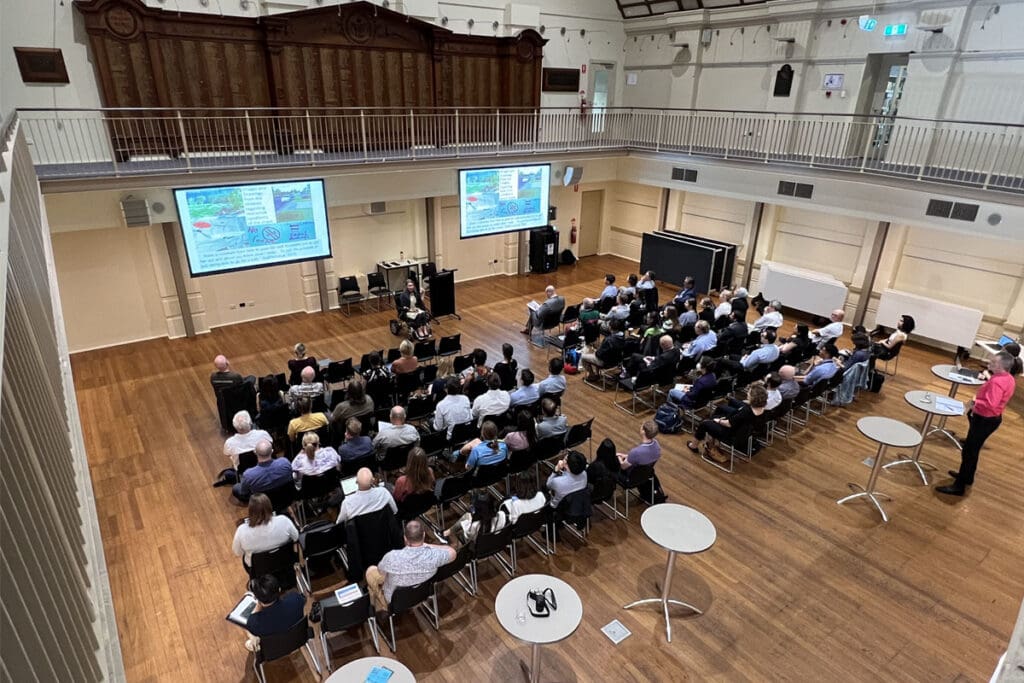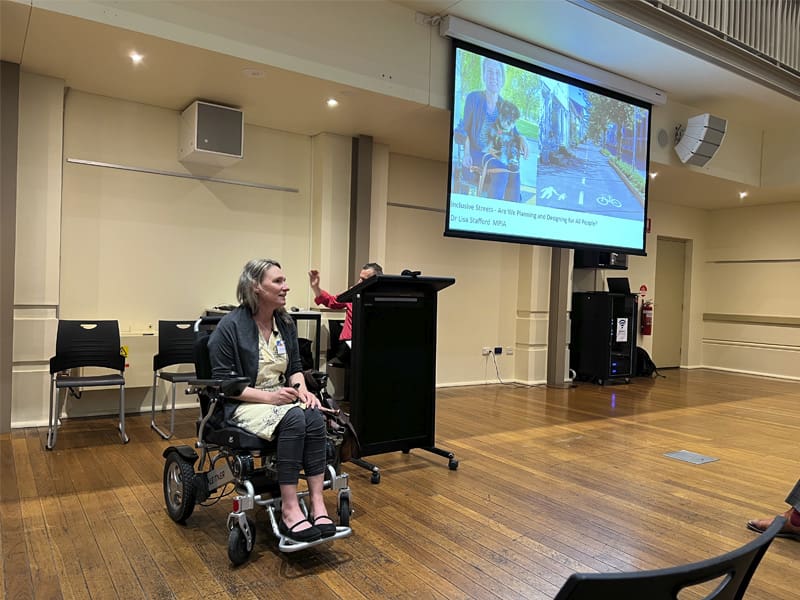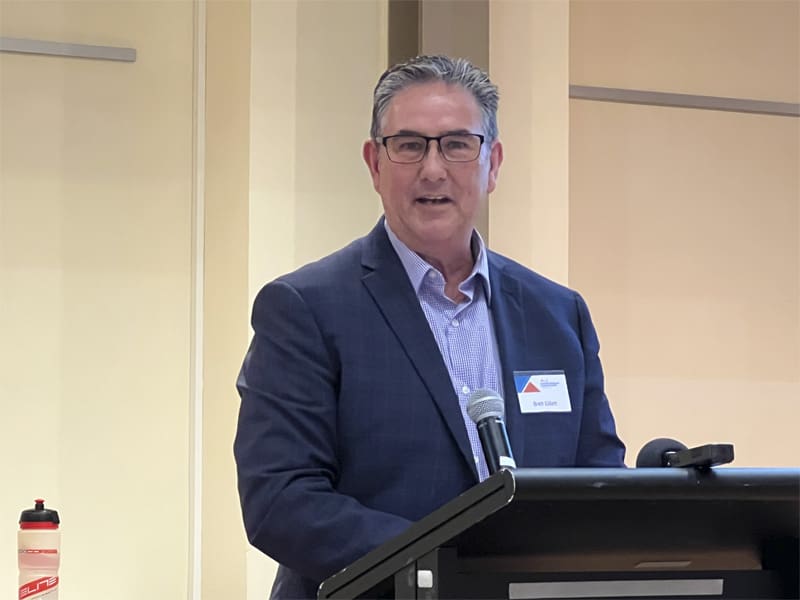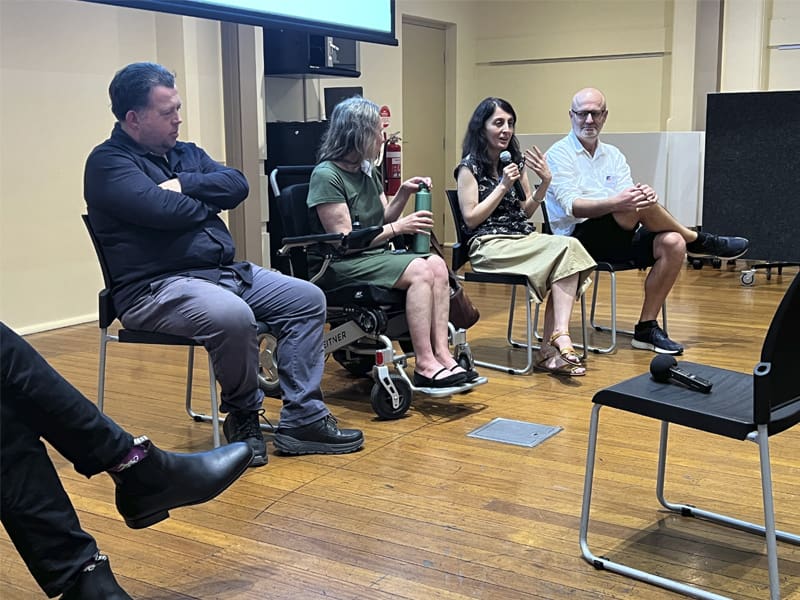Australian Walking & Cycling Conference Shares Pathways to Change

Unley, SA
The Australian Walking and Cycling Conference (AWCC) is an entirely volunteer run national conference based in South Australia. This year’s AWCC was held from 19th to 20th October in the historic Unley Town Hall, about three kilometres south of Adelaide’s city centre.
You would think that with its mainly flat terrain, sunny weather and being home of the famous Tour Down Under, Adelaide would be Australia’s cycling Mecca. Unfortunately, the reality falls far short of this and in many measures such as State government funding of cycling infrastructure, SA falls way behind the still inadequate levels of other States and Territories.
But the AWCC committee has persisted undaunted with its conference that was first held in the year 2000. This year’s event featured the theme ‘Pathways to Change’ and attracted 78 delegates from all over Australia, just short of the pre-Covid record attendance.
Justin Hanson MLC, a government politician from South Australia’s Legislative Council, opened the conference by saying: “There’s a recognition that active and local transport has to be a State responsibility, not just left to local government.”
Unfortunately, apart from boasting about how a committee had been formed by the current government which took ‘only 12 months’ to present recommendations, none of which have been acted upon as yet, Mr Hanson had little evidence to back up his statement.

In SA, it has been up to local governments to progress active transport and the leading local government in this regard has been the 2023 conference host, the City of Unley.
In addition to presenting, Unley Mayor Michael Hewitson attended most of the conference and has clearly been a local champion in encouraging cycling and walking.
According to Mayor Hewitson, Unley has a cycling-to-work mode share of 5.6%, compared to 1.9% for Adelaide as a whole.
Many years ago, Unley was the first local government in SA to reduce the speed limit on all local roads from 60kmh to 40kmh.
Former City of Unley employee Heather Barclay gave a presentation in which she outlined the process to achieve that reduction. Work started in 1989, followed by a series of trials in small portions of the council area, each of which received about 80% positive feedback from local residents. Despite this, it still took a decade to enact state legislation which came into effect from 1st Jan 1999. It was not until March 2003, that the State adopted 50kmh speed limits on local roads, still 10km more than Unley and 20km more than advocates assert is the ideal local streets speed limit of 30kmh.

Timely Keynote Presentations
Both keynote speakers had important messages to share in their presentations.
Opening keynote speaker Dr Lisa Stafford began by saying “we need mobility justice”. She talked about ‘ableism’, which is a prejudice – sometimes subconscious – of designing cities based upon the perceptions of able-bodied people.
“Cars will pass 400mm closer if there’s a painted lane.”
“People with disabilities don’t want anything special. We just want to be able to access the community like everybody else,” she said.
She gave six points to achieve this outcome:
- confront ableism
- embed inclusive design
- value footpaths and shared paths as essential.
- do integrated planning well
- have inclusive urban design codes
- active & public transport infrastructure advocacy must be inclusive from the perspective of all users
On Day 2, Active Travel England’s director of inspections, Brian Deegan, gave a frank assessment of where Adelaide was up to compared to his home country.
“Paint is worse than doing nothing,” he said, referring to Adelaide’s bike infrastructure, which with rare exceptions consists of painted lanes on the shoulders of busy roads.
“Cars will pass 400mm closer if there’s a painted lane,” he said.
Brian is considered the ‘guru’ of active travel design in the UK and, through his role at Active Travel England, can have a major influence on what designs get build and what does not.

“Separation of both time and space is the golden rule for protected infrastructure,” he continued.
“Crossings are the key. If you can do nothing else, build good crossings (across busy roads) that link quiet areas.”
He also linked distance to pollution. “Every metre of separation from cars reduces the pollutants that cyclists and pedestrians inhale by 20% to 40%,” he reported.
Interesting presentations at the conference also included an address by Fiona Goodbody, the coordinator bike networks and programs at WA’s Department of Transport.
“You’ve got the greatest bike infrastructure in the world here… it’s just that you’ve got cars all over it!”
Fiona said it was not enough to build infrastructure, there also had to be adequate resources for community engagement and evaluation.
She said the WA department is using the ‘ACE’ model of project delivery – activation, consultation, evaluation. This could overcome problems such as projects being cancelled because of “bikelash”.
As part of the closing panel session, Brian Degan said: “In order for civilisation, you need a good traffic management plan, 30kmh speed limits and control of car parking.”
Referring to Adelaide’s wide streets and grid layout he said, “You’ve got the greatest bike infrastructure in the world here … it’s just that you’ve got cars all over it!”
